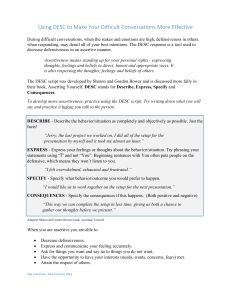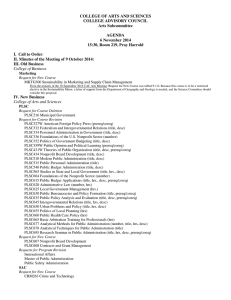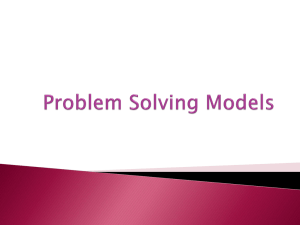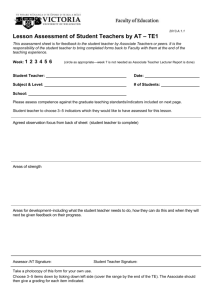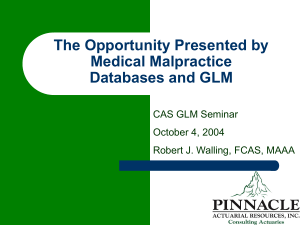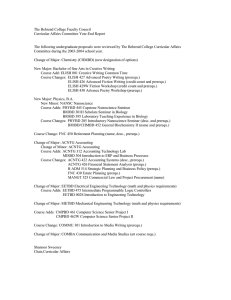Teaching-Learning
advertisement
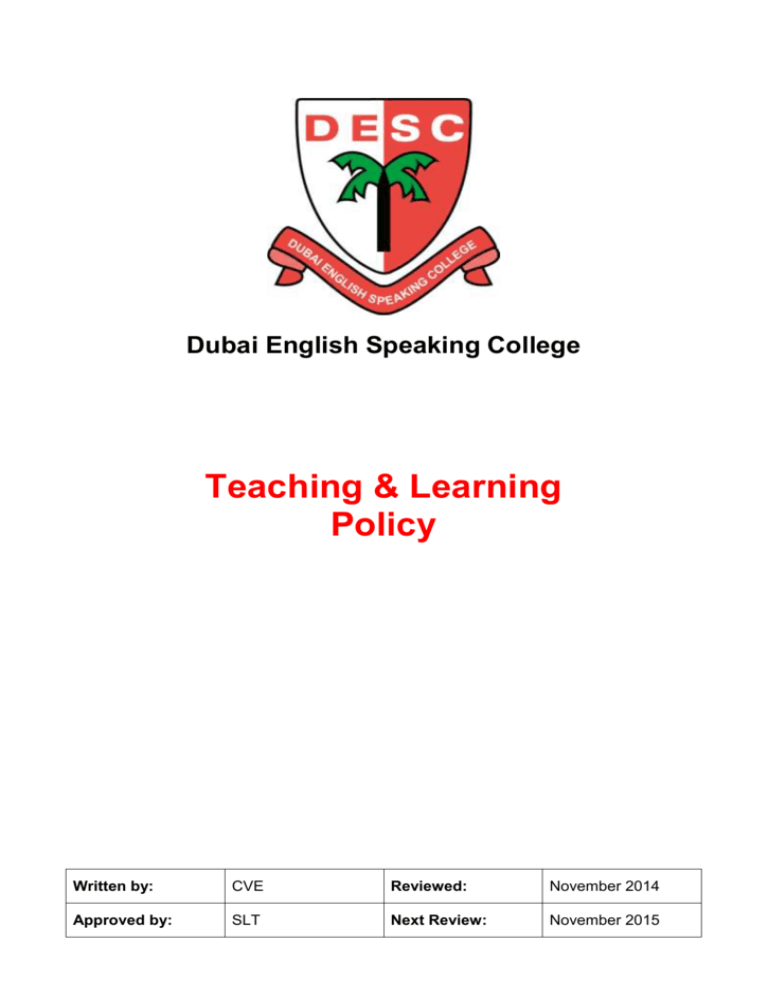
Dubai English Speaking College Teaching & Learning Policy Written by: CVE Reviewed: November 2014 Approved by: SLT Next Review: November 2015 Teaching and Learning at DESC Policy for September 2014 Since DESC opened in 2005, developing high-quality Teaching and Learning has been central to the core aims of the Leadership Team. At the heart of this is the notion that for students to be fully prepared for life after their time at DESC, they must develop their learning skills as well as a deep understanding of the curriculum. To enable this, teachers must carefully plan student-centred, interactive lessons that are appropriately challenging for all learners. The mindset of staff at DESC is one of determination to continually improve their practice. The vision of the school is central to Teaching and Learning at DESC: it appears at the heart of our Teaching and Learning Centre (TLC) and provides the structure for the key components necessary for excellence. All initiatives stem from this TLC, and each category has corresponding descriptions for what must, should and could take place, so that teachers can use this to evaluate their practice and understand what could be included for them to move forward. These can be found at www.desclearning.com and on the lesson observation feedback form. Four to Grow: Dare, Excel, Share, Create September 2014 marked the start of our journey to further engage staff and students with the learning and thinking skills agenda. By reducing the categories to 4 words, it became instantly memorable and so more fit-for-purpose than the cumbersome BLTS initiative. The aim is that the development of these skills will contribute to success across all aspects of school life. The Four to Grow system will develop throughout the year driven by teaching staff, Heads of Department and students who are empowered to incorporate the key ideas into their practice. 2 Teaching & Learning Policy Personalised Learning Appropriate stretch, challenge and support for all. Must - Teacher plans tasks that match the needs of the group, including how they will provide further challenge and support for identified students. The pace of the lesson is dictated by student progress rather than by planned content. Should - Teacher devises lessons according to prior assessment and subject targets, making full use of resources available to cater for learning needs. Learning Support Assistants (where applicable) are carefully deployed. Could - The teacher creates opportunities for students to direct their own learning according to their needs and choices. Students evaluate their needs and are supported to make suitable decisions to allow personal learning. Learning Support Assistants (where applicable) are an integral part of the lesson, frequently consulted and involved in planning. Students are encouraged to use technology on an independent basis, to consolidate classroom activities and learning. Inspiration and Motivation Students are interested and engaged in both independent and collaborative tasks. Must - Teacher plans student-centred activities that are appropriate and quickly re-engage any who are off-task. Students understand the big picture and relevance of their learning. Should - Teacher plans activities that exploit the interests of their learners and allow them to work both independently and collaboratively. The teacher enthuses and helps motivate learners; any confusion is quickly identified. Students demonstrate pride in their work. Teachers create dynamic, digital resources that motivate and enthuse students. Collaboration may be aided through the use of technology. Could - Students are enthusiastic and motivated, driving the direction of the lesson and taking ownership of their learning. The teacher allows students to lead, such as using them to explain concepts to their peers. Students use technology, when appropriate, to facilitate ownership of learning. Assessment and Questioning Students demonstrate and evaluate their understanding in a variety of ways. Quality feedback helps students move forward. Must - Teacher assesses student understanding through verbal and written means, evidenced through box bubble feedback in exercise books and records kept in staff planner and department database. Students know their level/grade and how to improve. Students are given sufficient time to respond. Should - The teacher’s questioning style promotes student involvement and is used to evaluate understanding. Teacher feedback is detailed and accurate, and provides advice to allow students to progress. Self- and Peer-assessment is a regular feature of lessons. Could - Activities encourage students to reflect on learning so that self-assessment and evaluation leads to student-generated targets. The teacher spends significant time with individuals and small groups, and also provides frequent, high-quality written feedback, which impacts on learning outcomes. Technology could be used to produce such feedback, record and monitor progress and generate targets. Communication Students confidently discuss learning and challenge others’ views appropriately. Strong learning relationships develop with their peers and teachers. Must - The teacher is always professional and regularly praises students. Students feel safe in contributing their ideas as a respectful learning environment is generated. 3 Teaching & Learning Policy Should - Good listening skills and empathy are used by both teachers and students. Teachers convey enthusiasm for learning and for their subject. Honest, constructive and encouraging feedback is communicated clearly, and is acted upon. Could - Lessons are dominated by student-speak and activity, rather than teacher-speak. Students collaborate effectively, sharing and challenging ideas and opinions appropriately. Students and teachers communicate their interests to foster strong working relationships. Students and teachers use technology, when appropriate, as a communication tool, to present ideas and express collaborative efforts. In September 2013, 3 posts for Advanced Skills Teachers (ASTs) were created. The ASTs and AHT for T&L have since initiated several projects and developments to support individual teachers, to create even better learning experiences for our students. All members of staff are encouraged to collaborate and evaluate the impact of teaching strategies, both at organised forums and informally. Progress in a member of staff’s teaching is monitored through the Professional Appraisal system, which takes into account evidence such as observations, as well as the exam performance of students. 4 Teaching & Learning Policy

